#mesopotamian polytheism
Text



from Lady of the Largest Heart, a poem by High Priestess Enheduanna & translated by Betty De Shong Meador.
551 notes
·
View notes
Text




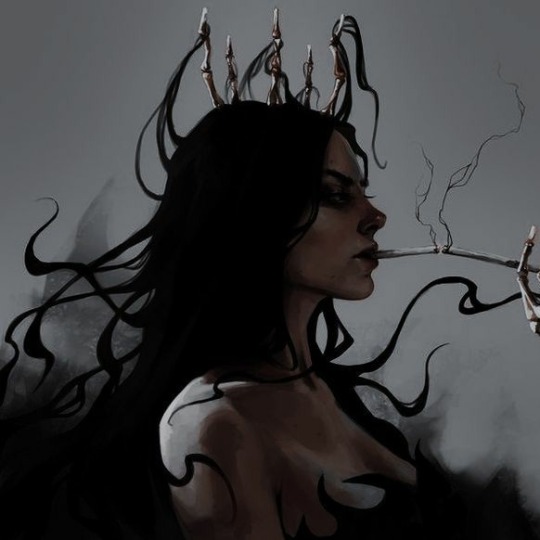




Deity Aesthetic: Ereshkigal
Mesopotamian goddess of death and Queen of the Mesopotamian Underworld , Kur. One of the most ancient gods of death.
Some of her titles:
Queen of the Great Below
Lady of the Great Earth
The Great Lady under Earth
#deities#mesopotamian mythology#mesopotamian polytheism#ereshkigal#mesopotamia#deity mood board#deity worship#deity moodboard#mesopotamian paganism#paganism#deity work#deity aesthetic#mythologyedit#mythology memes
142 notes
·
View notes
Text
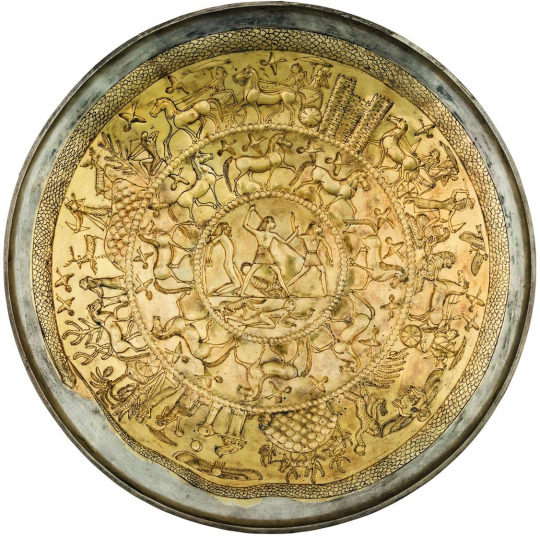
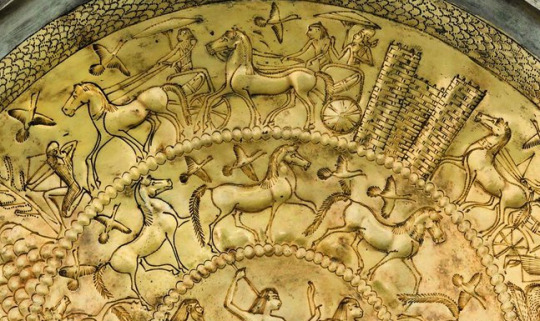
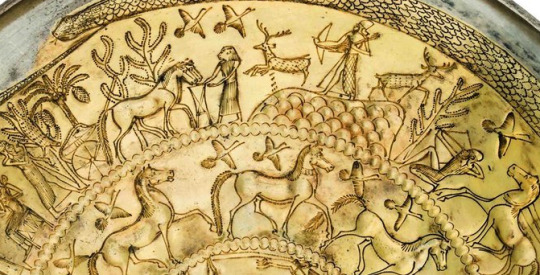
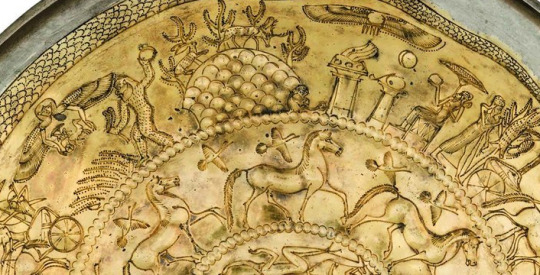
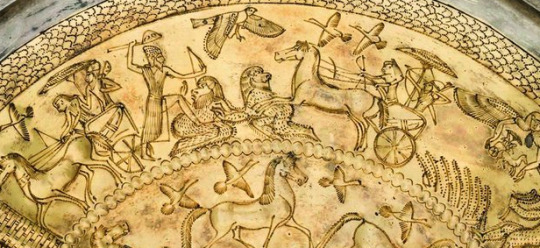
Phoenician Bowl with encircling Serpent
Bernardini Tomb (Palestrina, Italy)
c. 700 BCE
The National Etruscan Museum of Villa Giulia
Rome, Italy
#cyprus#rome#italy#egypt#egyptian gods#canaan#canaanite gods#phoenicia#phoenician gods#aram#aramean gods#syria#syrian gods#levantine gods#mesopotamia#mesopotamian gods#pagan gods#polytheism#archeology#magic#witchcraft#witchblr#paganblr#occult#uroboros#ouroboros#warfare#hunting#soldiers#birds
903 notes
·
View notes
Photo
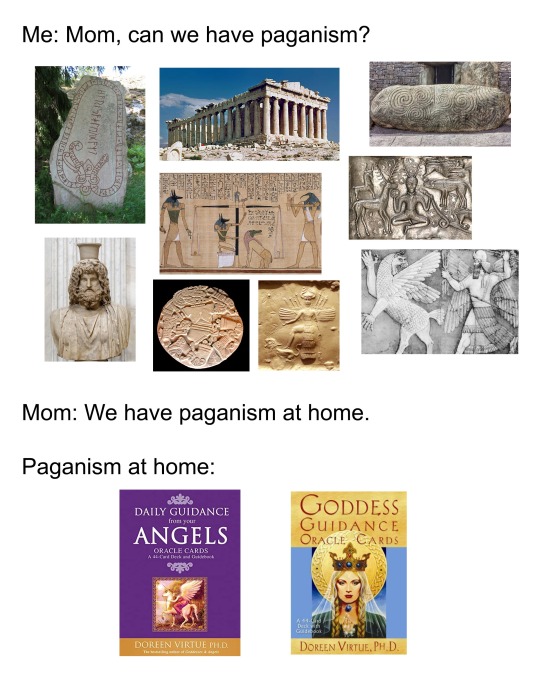
#pagan memes#paganism#neopaganism#memes#hellenic paganism#hellenic polytheism#helpol#norse paganism#asatru#egyptian paganism#kemeticism#mesopotamian mythology#sumerian#celtic paganism#doreen virtue
745 notes
·
View notes
Text
⚧️ The Gods & Gender ⚧️
Discussing Trans-Exclusive Radical Feminism and the views of the Gods is not "speaking for the Gods,"—it is looking at facts and information and drawing completely reasonable conclusions that squarely put the foundations of trans-exclusion in opposition to the Gods.
(definitely not audio proof read, sorry for the dyslexia)
🌿Aphrodite & Venus🌿
Aphroditos (or Aphroditus) is Aphrodite with male characteristics including a penis and/or beard.
A cult of Aphrodite included a bearded Aphrodite at Amathus, Cyprus on a high cliff temple. [Wikipedia citing Macrobius, Saturnalia III]
Her relationship with bisexuality (referring to being dual sex not sexual orientation in this paper), androgyny, and transvestism is also documented in Cyprus:
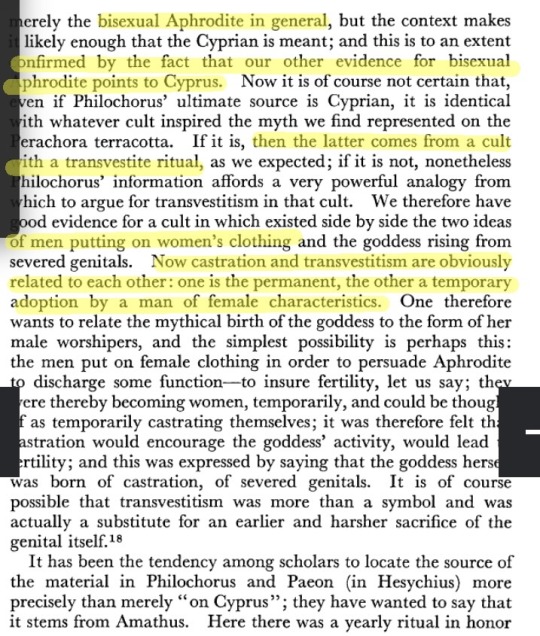
— Aphrodite in the Theogony by William Sale in Transactions and Proceedings of the American Philological Association Vol. 92 X
(Sorry for the shitty screenshot JSTOR did not want to work with me)
This worship of Aphrodite with a penis was also seen as equal to Venus:
There's also a statue of Venus on Cyprus, that's bearded, shaped and dressed like a woman, with scepter and male genitals, and they conceive her as both male and female. Aristophanes calls her Aphroditus, and Laevius says: Worshiping, then, the nurturing god Venus, whether she is male or female, just as the Moon is a nurturing goddess. In his Atthis Philochorus, too, states that she is the Moon and that men sacrifice to her in women's dress, women in men's, because she is held to be both male and female." — Macrobius (c. 400s AD), Saturnalia 3.8.2
🌿Hermaphroditus🌿
There is also the "intersex child of Aphrodite & Hermes" named Hermaphroditus.
I have seen many use Hermaphtoditus as an excuse to wipe away the Goddess Aphrodite with a penis that the ancients worshipped. Which doesn't even make sense because I hate to break it to you— Hemaphroditus also opposes TERF ideology by its nature. A God existing as bisexed/dual-sex/bigender (however you'd like to word it) negates the idea that the Gods somehow support the ridged biological essentialism and gender binary that TERF ideology necessitates.
There are different accounts of Hermaphtoditus' creation but one, Ovids, tells of him merging with a nymph and then asking his parents to make the water transformative causing men to have thr effeminate bodies like women:
Her prayer found gods to hear; both bodies merged in one, both blended in one form and face. As when a gardener sets a graft and sees growth seal the join and both mature together, thus, when in the fast embrace their limbs were knit, they two were two no more, nor man, nor woman--one body then that neither seemed and both. So when he saw the waters of the pool, where he had dived a man, had rendered him half woman and his limbs now weak and soft, raising his hands, Hermaphroditus cried, his voice unmanned, ‘Dear father [Hermes] and dear mother [Aphrodite], both of whose names I bear, grant me, your child, that whoso in these waters bathes a man emerge half woman, weakened instantly.’ Both parents hears; both, moved to gratify their bi-sexed son, his purpose to ensure, drugged the bright water with that power impure." — Ovid, Metamorphoses 4. 28 ff (trans. Melville) (Roman epic C1st B.C. to C1st A.D.)
🌿More on Aphroditos vs Hermaphroditus read @theoi-crow's excellent post about them here.
Also some lovely statues:
Marble copy statue from a fresco at Herculaneum, Italy. X (left)
Statue from Pergamum, Turkey. X (center)
Statue from Nymph Sanctuary in Lacori, Italy X (right)
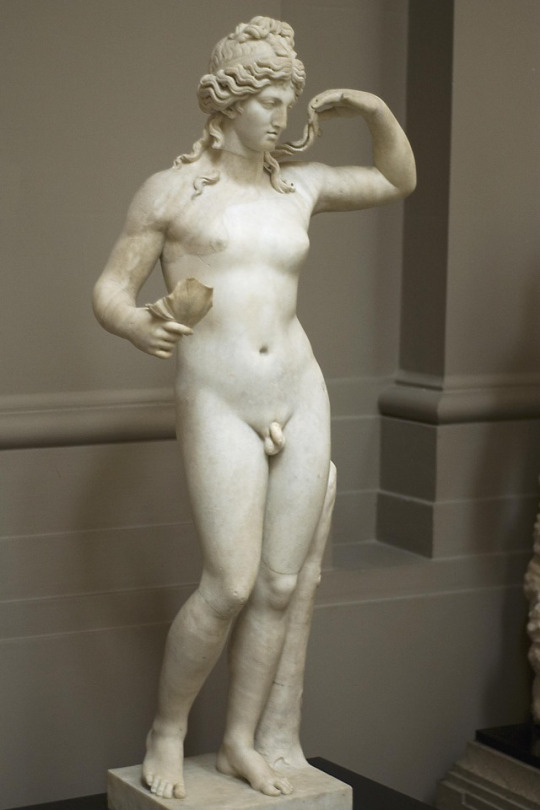
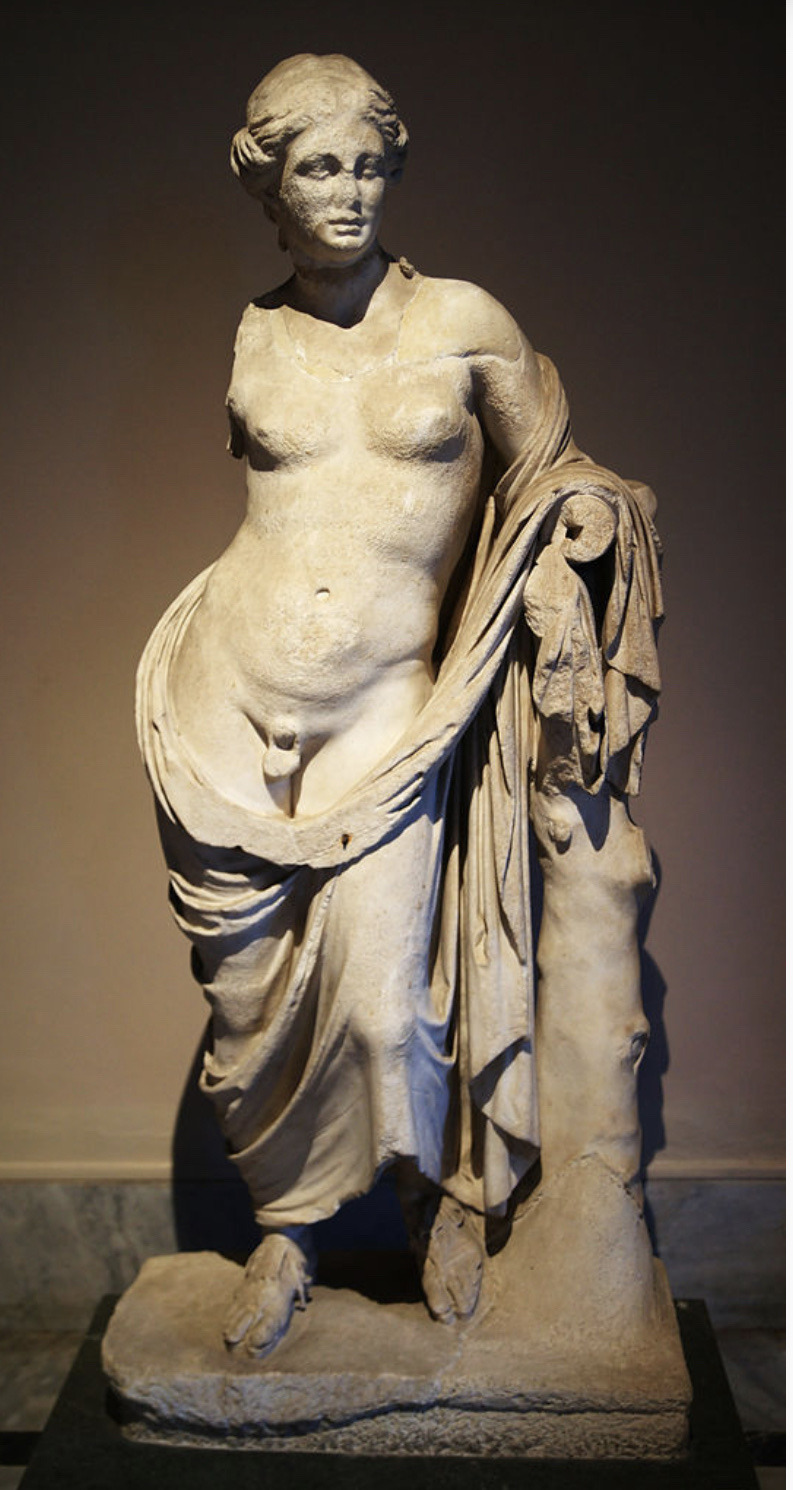
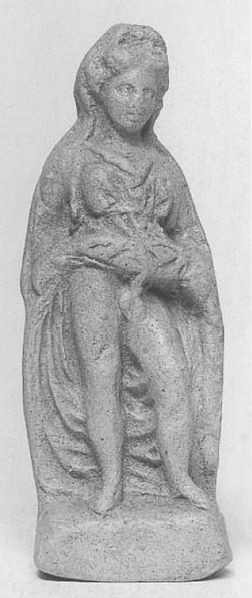
Statue from Pompeii, Italy X
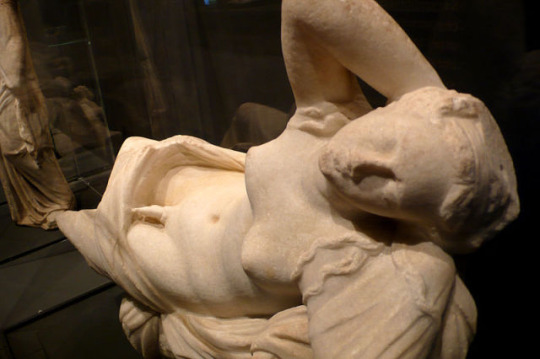
🌿Inana & Ishtar🌿
From a hymn to Inana
To open up roads and paths, a place of peace for the journey, a companion for the weak, are yours, Inana. To keep paths and ways in good order, to shatter earth and to make it firm are yours, Inana. To destroy, to build up, to tear out and to settle are yours, Inana. To turn a man into a woman and a woman into a man are yours, Inana. Desirability and arousal, goods and property are yours, Inana. Gain, profit, great wealth and greater wealth are yours, Inana. Gaining wealth and having success in wealth, financial loss and reduced wealth are yours, Inana. Observation (1 ms. has instead: Everything), choice, offering, inspection and approval are yours, Inana. Assigning virility, dignity, guardian angels, protective deities and cult centres are yours, Inana. — A Hymn to Inana (Inana-C) ETCSL 4.07.3 in Lines 115-131.
This shows:
Inana has the power to change a person's gender/sex .... which means people can change gender/sex
This is listed among other normal things such as journeys, wealth, settlements so on. Suggesting that it wasn't super special, it was a part of Sumerian society that Inana was given power over.
This was written by Enheduanna High Priestess of Nanna, Ur's city God, and Inana. Inana was a popular Sumerian deity and Enhenduanna's father, Sargon of Akkad's, personal deity was Ištar. One of Enhenduanna's goals as a priestess was to conflate the popular Sumerian deity Inana with her father's Akkadian personal Goddess Ištar. Then raise Inana (and thus her father's personal Goddess Ištar) to an extremely high place in cosmology and explain just how much control she had in society— including over sex/gender.
Also from @sisterofiris's post on Inana's queer priests here.
🌿Nanaya🌿
In later times Inana/Ištar was equated with Nanaya but in earlier times they were worshipped side by side as separate deities. While Inana's hymn gives her rule of gender, a Nanaya hymn has her directly declaring she has breasts in Dadumu and a beard in Babylon. Leick also mentions here that Ištar was worshipped in both genders.

—Dictionary of Ancient Near Eastern Mythology by Gwendolyn Leick. Page 125.
🌿Asūšunamir with Ereškigal🌿
In Ištar's Descent (not Inana's) Ea's plan to distract Ereškigal and get her to bring Inana back to life is to make a beautiful being. Ea makes an incredibly beautifully brilliant being that's mere aesthetic presence will make Ereškigal happy and let her defenses down. And Asūšunamir's beauty works..... and he is an eunuch, an effeminate male, potentially queer from the ancient's eyes. And yet he is so beautiful he distracts a Goddess.

— The Ancient Near East and Anyhology of Texts and Pictures, edited by Pritchard. Ishtar Descent translation by E.A Speiser. Page 80.
🌿Eštan / Ištanu🌿
The Anatolians (Hittite in particular) loved to both mix deities and keep them entirely dependent like 8 solar deities and 50 storm Gods. But sometimes Hittite, Hurrian, Hattic, Indo-European, Mesopotamian all meld together making the identification of gender ambiguous or even interchangeable.
Eštan is one example (who has numerous equatings):

—A Handbook of Gods and Goddesses of The Ancient Near East by Frayne & Stuckey. Page 105
You can also learn more about the Ištanu and the Sun Goddess of Arinna and her gender from @sisterofiris in a post here.
__
I'm sure there are more! But this was my quick round up and sources I could put together. To all the trans & non-binary polytheists out there, you aren't abnormal and the Gods see you for who you truly are.
Edit: Want some more? Learn about the feminine qualities of Apollo
#polytheism#paganism#helpol#lgbtq#hellenic polytheism#mesopotamian#disc horse#lgbt+#queer#landof2rivers#ofthetheoi
454 notes
·
View notes
Text
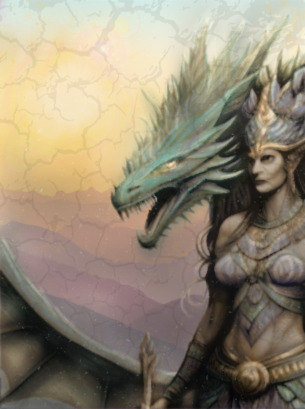
Tiamat, Mother of Oceans, Mother of Dragons, MotherofAll...
The name Tiamat is uncontracted form of the word tâmtu, meaning "sea". The long vowel â is contracted from the short vowels i and a. The word is in the "absolute state," a noun form that is equivalent to the vocative (a grammatical case which directly invokes or addresses a person or deity; literally the name means "O, sea!"). - Sophus Helle
Sophus Helle, 'Tiamat (goddess)', Ancient Mesopotamian Gods and Goddesses, Oracc and the UK Higher Education Academy, 2016
Back to top ^^
Released under a Creative Commons Attribution
#tiamat#Mesopotamian#marduk#ancient religion#mother of all#mother of dragons#mother of oceans#Oh#Sea!#polytheism#pagan community
4 notes
·
View notes
Note
that lilith anon just
like why do they need to worship lilith?
lilith and lilitu are separate entities. 'derives from' does not mean they are the same. at a bare bones level, even if lilith was based on lilitu, being based on or inspired by still doesn't mean they're the same.
lilith is part of a closed religion, and a closed practice. even if lilith and lilitu were aspects of each other (like the roman gods being considered aspects of the greek gods), the lilith aspect would still be closed.
i don't understand what doesn't click for that anon.
like just worship lilitu instead? (i'm not sure if mesopotamian polytheism itself is closed, mind, you, so maybe not? but the point stands - stop trying to make lilith into something she's not if there's an alternative that may not involve forcing yourself into closed spaces.)
not to mention
you simply cannot approach a demon the same way you would approach a goddess. they require different rituals, a different headspace, different protections etc. etc. etc.
Because much like their colonialist ancestors, white gentiles are entitled.
To them, everything is fair game. Everything is theirs by default. There's no reason why everything shouldn't just be theirs, if they want it. There's no such thing as taking "no" for an answer. Nobody should ever tell them "no".
They treat the world like their playground, and cultures, religions, traditions, practices, spiritualities, people, are all their toys.
And gods forbid if anybody tries to take a toy away from them.
27 notes
·
View notes
Text
Lex Luthor: A Demonic Role
(Here it is, as promised!! It got VERY long but I think Tumblr cuts off posts now... if not I’lll edit in a read more (it’s nearly midnight and I didn’t proofread this so hopefully it is ok and at least a little insightful/interesting:)
So as promised– my Lex Luthor and demons post!! This might go along with @catie-does-things Clark as a saint post from years ago that is still excellent (I am now also considering Clark as a St Michael specifically and in contrast to Lex but that needs more exploration)
Anyway I was listening to this specific episode of the podcast The Lord of Spirits, where two Orthodox priests discuss…. spirits. As a general disclaimer I am not Orthodox. I am not even an Eastern Catholic, I am just a humble Roman and a Modern American laywoman at that. So that perspective colors my approach here a bit. As another disclaimer is that I did not re-listen to the podcast and it’s been about a week since I first listened– I did, however find the transcript and am referencing, likely quoting it– it can be found here, along with the show. I am also not an expert on ancient near-East cultures and so if my language is not precise, please forgive me.
To summarize the episode (and I guess the podcast as a whole), they are discussing how we encounter the spiritual in the physical world, and that our term of “angel” is not entirely specific as “angel” is a rank (messenger). As English speakers, we kind of dance around the idea that there are other “gods” because we think that means we are talking about polytheism. But the Hebrew does not and is pretty clear there is only one God worthy of worship even if there are these other spiritual beings, lower case gods. For ease of this post, I will use gods to refer to named pagan gods, and angels/demons to reference spiritual beings– however, note that pagan gods and demons (that is, a fallen angel in the English sense) are the same.
What does that have to do with Lex Luthor? I am getting there. This specific episode talks about pagans and pagan beliefs. Pagans were not dumb– they were experiencing the same spiritual reality that we are— but they were misguided and misled. Many of the demons who fell had been assigned to different natural phenomena or nations – the sun, the stars, storms, various nations or cities. They are supposed to direct worship to the only God worthy of worship– the Hebrew God, the actual Most High, but many began to accept the worship of humans and so this is part of their fall.
One point the podcast returns to is these succession myths– that is, across various cultures, there is usually a myth of a son of god (or at least a new god) overthrowing the previous high god– Zeus overthrowing Cronus, Cronus overthrowing his father are common ones we know but there are two Mesopotamian/babylonian ones involving Baal as well, who we know is a frequent player in the Bible. This is essentially demon propaganda– the demons remember are spiritual beings who rebelled against God by rejecting Him and refusing to serve Him– but they could not actually overthrow the actual Most High God, so they tell stories to the humans of how they wish it had gone. For some more in depth, here is a quote from the podcast:
Fr. Stephen: The first of these probably is what’s referred to, generally by scholars, in all of these stories together, is you find in pretty much every ancient culture some version of what’s called the succession myth, which is, bare bones, the idea that there was a—we talked before about how there was the idea of a council of gods and sort of a divine father-type god, and then a divine son who was the head of the council. We talked about how in Israel that was Yahweh in both cases, so you already have [this binary] built into ancient Israel religion. But the idea in most of the other cultures of the ancient world, pretty much universally, is that there was an original most high god, who was overthrown at least once by a later god who rose up from among the council, by one of his sons in the council, who overthrew him and took his place, that of the most high god.
So the most common—you mentioned Baal already—this happens with Baal. The Baal cycle is primarily the tale of Baal’s insurrection. This happens twice in Babylonian mythology. It happens twice in Greek mythology, as people may be aware, when Chronos castrates his father, Uranos or Uranus, and becomes most high god, and then Zeus later kills his father Chronos and takes his place. So there are actually two successions there, as well as in Babylonian mythology.
So you have this story of a rebellion, but in every case in these other nations, that rebellion was successful, and of course the version that we are going to see in the Old Testament in the Hebrew Scriptures is going to be inverted in that this insurrection is going to have failed.
Lex Luthor, of course, buys into this. He projects his hatred for his father– who used his power to abuse Lex– onto God– and then onto Superman. He is attempting the succession myth – “and now god bends to my will”-- it appears to work too– he might be in jail but by the end he’s “killed” a god, he’s won.
Another fall of the demons, however, is also giving humans knowledge and technology they are not ready for– the podcast doesn’t get super in depth about that (or if it did, it was the part where I was driving in a congested area and I missed some of it lol), but they did specifically address Prometheus from the Greeks and alluded to other Sumerien myths. It’s a bit of a long quote from the transcript, but I think it’s worthwhile:
There’s a narrative before the flood and then after the flood. Before the flood, that’s the time of the seven sages, the Apkallu, the first of which comes out of the sea, and as an Apkallu has one of these lesser gods who is advising him. Because of this advisor, the king is able to create astrology, magic, technology, all of these things, based on this knowledge that he’s given from these spirits.
The major figures in Cain’s line who are named, it talks about the technological innovations that they produced, which are weapons of war, all of these things. So this idea is, yes, these spirits gave technology to man, but it was not to benefit man; they were giving man technology that humanity wasn’t ready for, but for destroying themselves.
…
Fr. Andrew: Right, and this same story is played out in multiple other ancient mythologies. The one that probably most of our listeners are familiar with is Greek mythology, and you’ve got the story of Prometheus, who gives fire from the gods to mankind. But of course in that story, it’s depicted as Prometheus… It’s correct in the sense that Prometheus is sort of rebelling, he’s doing something he’s not supposed to be doing, but it’s presented as positive, like: look at this wonderful gift that he gave mankind.
But the problem, of course, is that, again, it’s propaganda. This is these demons saying, “Look at all these good things that we gave you. Why don’t you just go ahead and bow down and worship us?” … There’s this promise of being great, being smart, being beautiful, being popular, being wealthy, being prestigious—if only you would serve whatever it is that you are asked to serve. It’s a trick. As you said, it’s for their destruction. Notice whom this technology is given to; it’s given to Cain, the first murderer, and to his descendants.
But the problem, of course, is like, you look at this stuff, and you’re like: What’s so wrong with iron-working and with music? What’s wrong with that stuff?
Fr. Stephen: Right, and it gets expanded firstly in the book of Jubilees, to include all kinds of things in terms of pharmaceuticals and sorcery and means of seduction of the opposite sex. But even if we’re just talking about raw technology, again, it’s not that it’s evil any more than the tree of knowledge of good and evil is evil in and of itself, but it was wisdom for which humanity wasn’t ready to use it appropriately. So it comes to these men as: “I’m giving you this knowledge so that you can use it to gain power and to conquer your neighbors, to set yourself up as a king, to seduce members of the opposite sex, so you will have this power and wealth and authority,” and that’s what humanity uses it for.
From the pagan perspective, kingship and these kings are these glorious beings; from the perspective of Scripture, they are these wicked beings who are destroying themselves and each other and the world around them.
I bolded the parts that remind me of Lex in particular. We have talked before about how BvS, is, to an extent, entirely about power (“men with power obey neither policy nor principle” “that’s how it starts the the fever, the rage, the feeling of powerlessness that turns good men cruel” “knowledge without power is paradoxical” “do you know the oldest lie in the book, Senator? That power can be innocent – good luck,” “if God is all-good, he cannot be all powerful, if God is all powerful, He cannot be all good… and neither can you be”)
We see Lex is seeking power throughout the movie– he is projecting his rage at his father, who abused his power and authority over Lex, onto both God and Superman. Bruce, also, feels powerless against the violence enacted upon him, but that’s a separate post, we are focusing on Lex, who is attempting to re-gain power he feels he does not have. Interestingly, when he confronts Superman on the rooftop, he has the Advantage– he is the wealthy, authoritative one, wielding all the power and yet…. Still casting himself as a victim.
Anyway, back to the technology distribution – Lex specifically mentions Prometheus– I just watched this scene– he says “Prometheus went with us and he ruined Zeus’ plan to destroy mankind… and for that he was given a thunderbolt! Zoom! Seems unfair.” Diana rolls her eyes at this, but it’s an excellent throw-away line about Lex’s perception of both himself and the world– he is viewing himself as a Prometheus figure.
We know Lex is obsessed with power and knowledge– he has a weird breakdown over it at the Friends of the Metropolis Library speech immediately following his mention of Prometheus – “the bittersweet pain among men is having knowledge with no power because that is paradoxical”. – We also see Lex exploring technology he was not ready for – he tells Bruce ““My R and D is up to all sorts of no good” – which on the surface is bit of light hearted business Talk…but we, as the audience, know better. We know he is messing around with Kryptonite and with Zod’s body. We see him in the Genesis chamber, assuming command. The Genesis Chamber tells him it has knowledge from a hundred thousand different worlds and Lex says-- “good, teach me”. This concludes with him over-riding the chamber itself and participating in the creation of an abomination, an abomination he is warned against. He is using technology for his own gain, for his own power-- for evil-- he was not prepared for it and does not use it appropriately
(We have talked before about how doomsday also casts Lex in a Creator and Father role, once more casting of himself as a mythological high god.)
ANOTHER piece here– Lex messing around with alien technology, with things that were Beyond him and not made for him– at least not yet– leads him to contact with Darkseid. He knows Darkseid is coming – the bell can’t be unrung– and seems to be working in his service. Beyond that– he intends to distribute this technology –he wants to get an import license for the Kryptonite so we don’t have to rely on the kindness of strangers. Obviously he will still have control but… he allows Bruce to take the Kryptonite because he wants Bruce to have it. He intends for Bruce to have it… as part of his plan to take down a god.
So we have Lex actively casting himself both in a succession myth and as a benevolent, powerful being, providing technology to the simple folk (the way he says “kindness of strangers”-- the mocking of the Southern accent….). He is the type of man to enjoy a Good Narrative– his constant referencing of mythology and art and even his Lolita references– and so how he places himself as a god, not realizing he is only buying into propaganda, that he is orchestrating his own fall.
His complete rejection of good has invited the demonic into his life. He’s unleashed something he is incapable of controlling and in fact threatens him— not just Doomsday but an old god beyond his control (in an act of seeking power and control for himself). In casting himself as a god, he has only given himself the role of a fallen god– a demon, who has no more power and authority over God than he did as a man.
(There are similar ideas here also with Suicide Squad’s Enchantress – but that’s a different post.)
#dceu#lex luthor#zack snyder#chris terrio#batman v superman#i uh wish this were better but i want it out there#bvs#bvs:doj#dawn of justice#batman v superman dawn of justice
16 notes
·
View notes
Text
i DESPERATELY NEED. a book or study about how ancient religions influenced early abrahamic religions and how there are (or IF there are) traces of these ancient religions which still exist in them today. like I know Judaism came from ancient Semitic polytheism, which was influenced by hellenism, ancient Egyptian religion, mesopotamian religion, canaanite religion etc etc ... but there r very obvious parts of modern Christianity that r inspired or drawn from ancient polytheistic religions I NEED like an in-depth discussion about this
#like i know the most abt hellenism so thats what im thinking abt#like... abrahamic god is so obviously derived from jove (but i think the patriarch god is a common concept overall ofc)#or... the flood myths... or... the fruit of knowledge vs pandoras box etc ...#like are these syncretisms!?!? or did these stories convergently develop?? and if so WHY??
3 notes
·
View notes
Text
Polytheism - Wikipedia
Polytheism was the typical form of religion before the development and spread of the Abrahamic religions of Judaism, Christianity, and Islam, which enforce monotheism. It is well documented throughout history, from prehistory and the earliest records of ancient Egyptian religion and ancient Mesopotamian religion to the religions prevalent during Classical antiquity, such as ancient Greek religion and ancient Roman religion, and in ethnic religions such as Germanic, Slavic, and Baltic paganism and Native American religions.
GAMEBRED TROPICANA
2 notes
·
View notes
Text
HISTORY OF ACHAEMENID IRAN
Tentative diagram of the 40-hour seminar
(in 80 parts of 30 minutes)
Prof. Muhammad Shamsaddin Megalommatis
Tuesday, 27 December 2022
--------------------------
To watch the videos, click here:
https://www.patreon.com/posts/history-of-iran-76436584
To hear the audio, click here:
-------------------------------------------
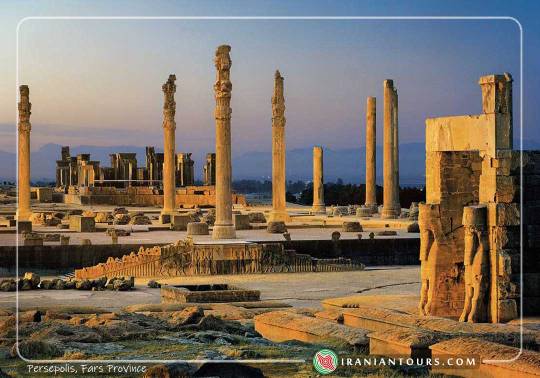
1 A - Achaemenid beginnings I A
Introduction; Iranian Achaemenid historiography; Problems of historiography continuity; Iranian posterior historiography; foreign historiography
1 B - Achaemenid beginnings I B
Western Orientalist historiography; early sources of Iranian History; Prehistory in the Iranian plateau and Mesopotamia
2 A - Achaemenid beginnings II A
Brief Diagram of the History of the Mesopotamian kingdoms and Empires down to Shalmaneser III (859-824 BCE) – with focus on relations with Zagros Mountains and the Iranian plateau
2 B - Achaemenid beginnings II B
The Neo-Assyrian Empire from Shalmaneser III (859-824 BCE) to Sargon of Assyria (722-705 BCE) – with focus on relations with Zagros Mountains and the Iranian plateau
3 A - Achaemenid beginnings III A
From Sennacherib (705-681 BCE) to Assurbanipal (669-625 BCE) to the end of Assyria (609 BCE) – with focus on relations with Zagros Mountains and the Iranian plateau
3 B - Achaemenid beginnings III B
The long shadow of the Mesopotamian Heritage: Assyria, Babylonia, Elam/Anshan, Kassites, Guti, Akkad, and Sumer / Religious conflicts of empires – Monotheism & Polytheism
4 A - Achaemenid beginnings IV A
The Sargonid dynasty and the Divine, Universal Empire – the Translatio Imperii
4 B - Achaemenid beginnings IV B
Assyrian Spirituality, Monotheism & Eschatology; the imperial concepts of Holy Land (vs. barbaric periphery) and Chosen People (vs. barbarians)
5 A - Achaemenid beginnings V A
The Medes from Deioces to Cyaxares & Astyages
The early Achaemenids (Achaemenes & the Teispids)
5 B - Achaemenid beginnings V B
- Why the 'Medes' and why the 'Persians'?
What enabled these nations to form empires?
6 A - Zoroaster A
Shamanism-Tengrism; the life of Zoroaster; Avesta and Zoroastrianism
6 B - Zoroaster B
Mithraism vs. Zoroastrianism; the historical stages of Zoroaster's preaching and religion
7 A - Cyrus the Great (Cyrus II) I A
The end of Assyria, Nabonid Babylonia, and the Medes
7 B - Cyrus the Great (Cyrus II) I B
The Nabonidus Chronicle
8 A - Cyrus the Great (Cyrus II) II A
Cyrus' battles against the Medes
8 B - Cyrus the Great (Cyrus II) II B
Cyrus' battles against the Lydians
9 Α - Cyrus the Great (Cyrus II) III A
The Battle of Opis: the facts
9 Β - Cyrus the Great (Cyrus II) III B
Why Babylon fell without resistance
10 A - Cyrus the Great (Cyrus II) IV A
Cyrus Cylinder: text discovery and analysis
10 B - Cyrus the Great (Cyrus II) IV B
Cyrus Cylinder: historical continuity in Esagila
11 A - Cyrus the Great (Cyrus II) V A
Cyrus' Empire as continuation of the Neo-Assyrian Empire
11 B - Cyrus the Great (Cyrus II) V B
Cyrus' Empire and the dangers for Egypt
12 A - Cyrus the Great (Cyrus II) VI A
Death of Cyrus; Tomb at Pasargad
12 B - Cyrus the Great (Cyrus II) VI B
Posterity and worldwide importance of Cyrus the Great
13 A - Cambyses I A
Conquest of Egypt and Cush (Ethiopia: Sudan)
13 B - Cambyses I B
Iran as successor of Assyria in Egypt, and the grave implications of the Iranian conquest of Egypt
14 A - Cambyses II A
Cambyses' adamant monotheism, his clash with the Memphitic polytheists, and the falsehood diffused against him (from Egypt to Greece)
14 B - Cambyses II B
The reasons for the assassination of Cambyses
15 A - Darius the Great I A
The Mithraic Magi, Gaumata, and the usurpation of the Achaemenid throne
15 B - Darius the Great I B
Darius' ascension to the throne
16 A - Darius the Great II A
The Behistun inscription
16 B - Darius the Great II B
The Iranian Empire according to the Behistun inscription
17 A - Darius the Great III A
Military campaign in Egypt & the Suez Canal
17 B - Darius the Great III B
Babylonian revolt, campaign in the Indus Valley
18 A - Darius the Great IV A
Darius' Scythian and Balkan campaigns; Herodotus' fake stories
18 B - Darius the Great IV B
Anti-Iranian priests of Memphis and Egyptian rebels turning Greek traitors against the Oracle at Delphi, Ancient Greece's holiest shrine
19 A - Darius the Great V A
Administration of the Empire; economy & coinage
19 B - Darius the Great V B
World trade across lands, deserts and seas
20 A - Darius the Great VI A
Rejection of the Modern European fallacy of 'Classic' era and Classicism
20 B - Darius the Great VI B
Darius the Great as the end of the Ancient World and the beginning of the Late Antiquity (522 BCE – 622 CE)
21 A - Achaemenids, Zoroastrianism, Mithraism, and the Magi A
Avesta and the establishment of the ideal empire
21 B - Achaemenids, Zoroastrianism, Mithraism, and the Magi B
The ceaseless, internal strife that brought down the Xšāça (: Empire)
22 A - The Empire-Garden, Embodiment of the Paradise A
The inalienable Sargonid-Achaemenid continuity as the link between Cosmogony, Cosmology and Eschatology
22 B - The Empire-Garden, Embodiment of the Paradise B
The Garden, the Holy Tree, and the Empire
23 A - Xerxes the Great I A
Xerxes' rule; his upbringing and personality
23 B - Xerxes the Great I B
Xerxes' rule; his imperial education
24 A - Xerxes the Great II A
Imperial governance and military campaigns
24 B - Xerxes the Great II B
The Anti-Iranian complex of inferiority of the 'Greek' barbarians (the so-called 'Greco-Persian wars')
25 A - Parsa (Persepolis) A
The most magnificent capital of the pre-Islamic world
25 B - Parsa (Persepolis) B
Naqsh-e Rustam: the Achaemenid necropolis: the sanctity of the mountain; the Achaemenid-Sassanid continuity of cultural integrity and national identity
26 A - Iran & the Periphery A
Caucasus, Central Asia, Siberia, Tibet and China Hind (India), Bengal, Deccan and Yemen
26 B - Iran & the Periphery B
Sudan, Carthage and Rome
27 A - The Anti-Iranian rancor of the Egyptian Memphitic priests A
The real cause of the so-called 'Greco-Persian wars', and the use of the Greeks that the Egyptian Memphitic priests made
27 B - The Anti-Iranian rancor of the Egyptian Memphitic priests B
Battle of the Eurymedon River; Egypt and the Wars of the Delian League
28 A - Civilized Empire & Barbarian Republic A
The incomparable superiority of Iran opposite the chaotic periphery: the Divine Empire
28 B - Civilized Empire & Barbarian Republic B
Why the 'Greeks' and the Romans were unable to form a proper empire
29 A - Artaxerxes I (465-424 BCE) A
Revolt in Egypt; the 'Greeks' and their shame: they ran to Persepolis as suppliants
29 B - Artaxerxes I (465-424 BCE) B
Aramaeans and Jews in the Achaemenid Court
30 A - Interregnum (424-403 BCE) A
Xerxes II, Sogdianus, and Darius II
30 B - Interregnum (424-403 BCE) B
The Elephantine papyri and ostraca; Aramaeans, Jews, Phoenicians and Ionians
31 A - Artaxerxes II (405-359 BCE) & Artaxerxes III (359-338 BCE) A
Revolts instigated by the Memphitic priests of Egypt and the Mithraic subversion of the Empire
31 B - Artaxerxes II (405-359 BCE) & Artaxerxes III (359-338 BCE) B
Artaxerxes II's capitulation to the Magi and the unbalancing of the Empire / Cyrus the Younger
32 A - Artaxerxes IV & Darius III A
The decomposition of the Empire
32 B - Artaxerxes IV & Darius III B
Legendary historiography
33 A - Alexander's Invasion of Iran A
The military campaigns
33 B - Alexander's Invasion of Iran B
Alexander's voluntary Iranization/Orientalization
34 A - Alexander: absolute rejection of Ancient Greece A
The re-organization of Iran; the Oriental manners of Alexander, and his death
34 B - Alexander: absolute rejection of Ancient Greece B
The split of the Empire; the Epigones and the rise of the Orientalistic (not Hellenistic) world
35 A - Achaemenid Iran – Army A
Military History
35 B - Achaemenid Iran – Army B
Achaemenid empire, Sassanid militarism & Islamic Iranian epics and legends
36 A - Achaemenid Iran & East-West / North-South Trade A
The development of the trade between Egypt, Anatolia, Mesopotamia, Iran, Turan (Central Asia), Indus Valley, Deccan, Yemen, East Africa & China
36 B - Achaemenid Iran & East-West / North-South Trade B
East-West / North-South Trade and the increased importance of Mesopotamia and Egypt
37 A - Achaemenid Iran: Languages and scripts A
Old Achaemenid, Aramaic, Sabaean and the formation of other writing systems
37 B - Achaemenid Iran: Languages and scripts B
Aramaic as an international language
38 A - Achaemenid Iran: Religions A
Rise of a multicultural and multi-religious world
38 B - Achaemenid Iran: Religions B
Collapse of traditional religions; rise of religious syncretism
39 A - Achaemenid Iran: Art and Architecture A
Major archaeological sites of Achaemenid Iran
39 B - Achaemenid Iran: Art and Architecture B
The radiation of Iranian Art
40 A - Achaemenid Iran: Historical Importance A
The role of Iran in the interconnection between Asia and Africa
40 B - Achaemenid Iran: Historical Importance B
The role of Iran in the interconnection between Asia and Europe
--------------------------------------
Download the diagram here:
#Achaemenid#Megalommatis#Ancient Iran#Old Achaemenid#Persia#Persians#Media#Orientalism#Medes#History of Ancient Iran
3 notes
·
View notes
Text
Said this on Twitter but intracommunal Norse Heathen Loki hate is deeply rooted in transphobia it would behoove more Pagans in general to consider learning a thing or two about Mesopotamian Polytheism.
0 notes
Text

belief in one God. [2] The first major comprehensive draft of the Pentateuch (the series of five books which begins with Genesis and ends with Deuteronomy) is thought to have been composed in the late 7th or the 6th century BCE (the Jahwist source) and was later expanded by other authors (the Priestly source) into a work very like Genesis as known today. [3]
The two sources can be identified in the creation narrative: Priestly and Jahwistic. [4] The combined narrative is a critique of the Mesopotamian theology of creation: Genesis affirms monotheism and denies polytheism. [5]
Robert Alter described the combined narrative as "compelling in its archetypal character, its adaptation of myth to monotheistic ends". [6]
Scholarly writings frequently refer to Genesis as myth, for while the author of Genesis 1-11
"demythologised" his narrative by removing the Babylonian myths and those elements which did not fit with his own faith, it remains a myth in the sense of being a story of origins. [7] Biblical cosmology is the biblical writers' conception of the cosmos as an organised, structured entity, including its origin, order, meaning and destiny.
[1][2] The Bible was formed over many centuries, involving many authors, and reflects shifting patterns of religious belief;
consequently, its cosmology is not always consistent. [3][4] Nor do the biblical texts necessarily represent the beliefs of all Jews or - [ ] JUNGLEWOODNETHERRACKNETHERWARTENCHANTMENTTABLECHORUSFLOWERREDSTONEREPEATERREDSTONECOMPARATORTRiPWiREHOOKCOMMANDBLOCKSTiCKYPiSTONALiENSSPECiESFAiRiESDEiTiESGODSCLOWNSROBOTSANDROiDSARTiFiCiALiNTELLiGENCESBRAiNSPOWERSiNTELLiGENCEQUOTiENTSWORMSTAPEWORMSTUBESTUMORSCANCERSHOSTSENTiTiESFUNGiSPARASiTESBACTERiASAMiCROORGANiSMSMUSHROOMSSURGERiESSCiENCESPHYSiCSWiTCHCRAFTSMAGiCSVOODOOSHOODOOSWiZARDSWARLOCKSCULTSSECRETSOCiETiSALTEREGOSiNNERDEMONSCROSSROADDEMONSMEDiCALTREATMENTS CLONES
1 note
·
View note
Text


El, Father of the Gods, and the King of Ugarit
Ugarit, Syria
13th century BCE
Top: Image from cover of "Stories from Ancient Canaan" by Michael David Coogan, 1978
Bottom: Ancient Near Eastern Pictures Relating to the Old Testament
James Pritchard, 1969
#el#ilu#elyon#el elyon#egypt#egyptian gods#canaan#canaanite gods#phoenicia#phoenician gods#aram#aramean gods#syria#syrian gods#levantine gods#mesopotamia#mesopotamian gods#pagan gods#polytheism#archeology#magic#witchcraft#witchblr#paganblr#occult#ugarit#ugaritic#ugaritic gods#ras shamra#king
232 notes
·
View notes
Text
So, it hasn’t come up in their respective threads yet bu Haven absolutely does see Ana’Hira @divinamour and Loki @hraunwyf as gods.
I know that’s like “duh, they are” but the typical attitude of a lot of Marvel characters, at least that I’ve seen, is that the ‘gods’ that one typically encounters in this universe (ex: Asgardians) are just “sufficiently powerful beings from another world” and not omniscient, omnipotent, divine beings.
And like. . .no, they’re not omniscient and and omnipotent, but that’s actually NOT a requisite for being a god in most non-Abrahamic faiths. Whether it’s the Mesopotamians, Greeks and Romans, Egyptians, or Norse, the gods of most ancient religions had limitations and most didn’t know what was going on beyond their immediate sight, were not necessarily good people, were often flawed or even malevolent, did not control every single little thing that happened, they could absolutely be thwarted or tricked, and some could even die (with or without resurrection coming after). They’re still gods. And Haven was raised in a Hindu/Zoroastrian household, and most of her philosophy and outlook seems to come from Hinduism, which is a pluralistic religion, meaning there’s room in it for other faiths to be true. She can absolutely look at Loki or Perun or a god from an extraterrestrial pantheon and see them as just as real divinities as Skanda, Krishna, and, yes, Jesus. Just as real, and just as divine, and just as respected.
Now, Hinduism is also often called “monotheism masquerading as polytheism” in that the idea is that is actually ONE god and all the many Hindu gods (and presumably gods of other faiths too) are just manifestations of that god. So, yes, in that aspect, the Asgardians/Hellenics/etc aren’t God as in they aren’t that One Big God but like…they are gods, they are manifestations or aspects of God, they should be thought of and treated as such. That doesn’t mean she has to bow down and do everything they say, but she recognizes them for what they are and tries to be cognizant of that in her interactions. Being a god doesn’t mean being a god to some characters, but to Haven it does, because she’s working off a definition of god that isn’t the same norm as in the Western world.
1 note
·
View note
Text
Don't blame someone's disabilities on spirit(s) or God(s).
#ableism#polytheism#paganism#witchcraft#in mesopotamian cosmology/theology the gods or spirits can cause sicknesd and misfortune#but that is between the individual and the spirits/gods#not you#if you do this#you are ableist plain and simple#vague blogging#except not vague
173 notes
·
View notes